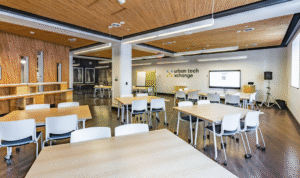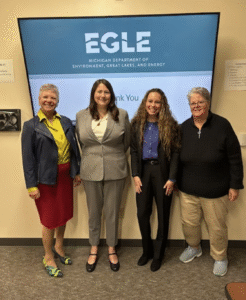
- Kim Kisner
- Education
- 04/11/2023
Climate Change is Key: ‘Michigan Has to Be a Leader’
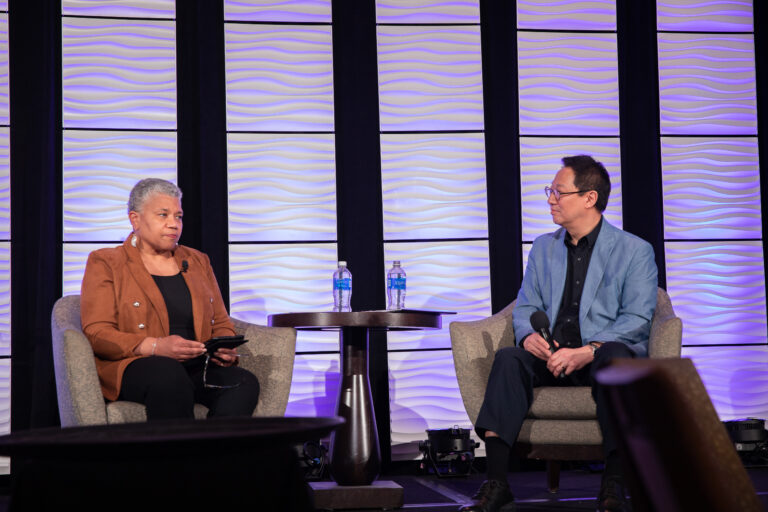
University of Michigan President Santa Ono has put sustainability and fighting climate change among his top priorities since he assumed the position in October.
In addition to several programs and initiatives that are being expanded or developed, the university is now serving as the lead institution for the University Climate Change Coalition which convenes 23 leading North American universities to work toward climate action on campuses, in communities, and at a global scale.
Ono spoke about his sustainability agenda for UofM at an April 5 luncheon attended by more than 250 stakeholders and business and organization leaders. The event was sponsored by the Erb Institute and hosted by the Sustainable Business Network Detroit and Inforum.

Tom Lyon, faculty director at the Erb Institute, kicked off the event by saying, “As we build toward expertise on sustainability the challenge is to think globally and act locally together, and the state, the universities, businesses, and all sectors have to be involved.”
John M. Erb, Erb Family Foundation chair, echoed that sentiment commenting, “We are all important stakeholders in balancing the needs of the people, planet, and economy and working toward a more sustainable future.”
Working together and the need to connect the dots toward saving the planet were primary themes.
Each of us is indispensable in responding to and resolving the biggest challenge our society has ever faced and solving this emergency transcends borders, Ono said. We need to come together in the form of a nexus to benefit us and all who follow us on this planet.
Ono said the university benefits from strength in numbers with 800+ sustainability faculty members, 100+ student organizations, and 8,000 Planet Blue Ambassadors.
He gave a special nod to students, saying, “Their passion has wowed me, and I have found that many times it’s the students who (first) identify and develop solutions.”
Some of UofM’s sustainability priorities include moving to 100% renewable purchased power by 2025, building on-campus solar installations with a capacity of 25 megawatts across the Dearborn, Flint, and Ann Arbor campuses – including Michigan Medicine and athletics – and achieving LEED Platinum status for all buildings.
Ono talked about the university’s historic ties with the city of Detroit and its responsibility toward it. “The university was established in 1817 at Cadillac Square in Detroit, and Mayor Duggan took me there saying that we have a great responsibility to the city, and he’s right.”
On March 6, the university announced new commitments for the $250 million University of Michigan Center for Innovation, previously known as the Detroit Center for Innovation. The project is a collaboration with Stephen Ross, chairman and majority owner of Related Companies, and the Ilitch family. Ono noted that the center will accommodate academic and community programs to include three distinct types of activity—graduate education, talent-based community development, and community engagement—all in the service of economic development and job growth for Detroit.
In the spirit of collaboration, Ono also pointed out that there were people attending the event from other
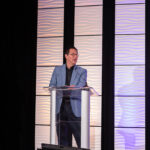
Michigan universities and applauded this, saying, “We have our competition on the fields and courts, but getting closer to other Michigan educational institutions is very important to UofM. We need MSU to make advances in agritech, and Wayne State University is a critical component to making advances in the city. We all need to work together and we are starting to do more of that now.”
Following his speech, Telva McGruder, Chief Diversity, Equity, and Inclusion Officer for General Motors Co. and member of the advisory board for the UofM School for Environment and Sustainability, moderated a Q&A. Below are some of the key questions and takeaways.
McGruder: What is your top priority as president of the University of Michigan?
Ono: Addressing climate change. I’ve been very vocal that this is my number one priority. Michigan has to be a leader here. And that is the wish of the collective voices of the university as well. Students are actually pushing me, and I appreciate that so much. I have told them to hold my feet to the fire.
McGruder: Regarding the notion of connecting the dots, how do you as a university leader – and how do leaders in other organizations – bring expertise together for progress?
Ono: I think the different pieces of the puzzle that exist illustrate opportunity. One part of the secret sauce at UofM is that each director has the autonomy to dream and be bold. Now, we need to collaborate and form connections around these ideas. The faculty and leadership and students have wowed me with their collaborative spirit.
McGruder: How can companies and organizations around the state connect with the efforts of the university?
Ono: We are working on making a “front door” more clear. We are going to invest and Identify someone to knit it together and act as the gatekeeper to reduce the barrier to communication inside and outside the university.
McGruder: Progress sometimes means people changing ways of doing things and letting go so that we can move forward. What are your thoughts as we move forward toward carbon neutrality on some of the things we have to encourage communities to let go of?
Ono: It goes both ways. Trust is a critical point. Leaders have to earn trust. We as a university have to go into communities knowing that we have as much to learn from them as they do from us. We as a university have made mistakes along the way, and so have other institutions and companies. Addressing that truthfully is a prerequisite to going into communities and working together.
McGruder: When it comes to funding, how do we help decision-makers and leaders within all sectors understand the need to spend on sustainability efforts?
Ono: Addressing the climate crisis is not a bottom-line budget issue it’s a social responsibility. And what is the point of a strong financial standpoint if there’s no planet to exist on?
A recording of the complete program can be found here: https://vimeo.com/815068547
Be sure to subscribe to our newsletter for regular updates on sustainable business practices in and around Detroit.
Kim Kisner
- All
- Business
- Community
- Education
- Events

Citizen Robotics is a Detroit-based nonprofit that advances the use of robotics and digital manufacturing in residential construction, focusing on improving productivity, sustainability, and long-term affordability. Best known for its early work in 3D-printed housing, it explores how alternative construction methods and new financial models can reduce material waste, lower lifetime operating costs, and enhance the resilience of homes. SBN Detroit interviewed Tom Woodman, founder and president of...

Detroit-based OneSix Energy is a clean-energy technology company focused on advancing a lower-carbon approach to hydrogen production. Headquartered at Newlab in Detroit, the startup is developing a proprietary methane pyrolysis system designed to produce hydrogen without carbon dioxide emissions, while also generating solid carbon as a co-product. SBN Detroit interviewed with cofounder Stefan Sysko about the company’s origins, its approach to hydrogen production, and why Detroit is positioned...
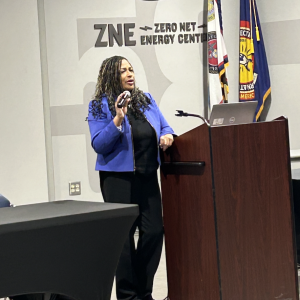
Regina Strong serves as Michigan’s first Environmental Justice Public Advocate, leading the state’s Office of the Environmental Justice Public Advocate. Her role focuses on addressing environmental justice concerns raised by communities, helping residents navigate environmental systems, and working across state agencies to improve equity in environmental decision-making. SBN Detroit interviewed Strong about the challenges communities are facing across Michigan and what environmental justice work looks like in practice....





